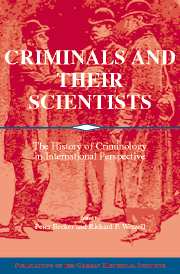Book contents
- Frontmatter
- Introduction
- Part One Nonacademic sites of Nineteenth-Century Criminological Discourse
- Part Two Criminology as Scientific and Political Practice in the Late Nineteenth and Early Twentieth Centuries
- Part Three The Making of the Criminologist
- 13 The International Congresses of Criminal Anthropology: Shaping the French and International Criminological Movement, 1886-1914
- 14 Making Criminologists: Tools, Techniques, and the Production of Scientific Authority
- 15 “One of the Strangest Relics of a Former State”: Tattoos and the Discourses of Criminality in Europe, 1880-1920
- 16 What Criminals Think about Criminology: French Criminals and Criminological Knowledge at the End of the Nineteenth Century
- 17 Talk of the Town: The Murder of Lucie Berlin and the Production of Local Knowledge
- Part Four Criminology in the First Half of the Twentieth Century: The Case of Weimar and Nazi Germany
- Index
13 - The International Congresses of Criminal Anthropology: Shaping the French and International Criminological Movement, 1886-1914
Published online by Cambridge University Press: 05 January 2013
- Frontmatter
- Introduction
- Part One Nonacademic sites of Nineteenth-Century Criminological Discourse
- Part Two Criminology as Scientific and Political Practice in the Late Nineteenth and Early Twentieth Centuries
- Part Three The Making of the Criminologist
- 13 The International Congresses of Criminal Anthropology: Shaping the French and International Criminological Movement, 1886-1914
- 14 Making Criminologists: Tools, Techniques, and the Production of Scientific Authority
- 15 “One of the Strangest Relics of a Former State”: Tattoos and the Discourses of Criminality in Europe, 1880-1920
- 16 What Criminals Think about Criminology: French Criminals and Criminological Knowledge at the End of the Nineteenth Century
- 17 Talk of the Town: The Murder of Lucie Berlin and the Production of Local Knowledge
- Part Four Criminology in the First Half of the Twentieth Century: The Case of Weimar and Nazi Germany
- Index
Summary
International congresses took on particular importance at the end of the nineteenth century. Numerous, diverse, and varied, these forums for communication, legitimacy, and power became essential for ideas, movements, and individuals as places to exchange views and, especially, to make their existence known. What were these congresses about? Were they primarily about curiosity, necessity, legitimacy, gaining political advantage - or about research?
The advantages of international congresses are so numerous and varied that each involves its own set of motivations. Through this case study of the international congresses of criminal anthropology - an analysis requisite to an understanding of the internal and external life and evolution of an intellectual movement - I will identify the various facets of these congresses and the stakes involved in their content, form, and attendance. I will also demonstrate the structuring role that these forums played, both nationally and internationally, in the development of the discipline and even more so in the development of a certain notion of a juridical “Europe” and the foundations of a juridical “international.”
Before discussing these international congresses, a few words are in order on the science of criminology, its origins, doctrines, and debates. It was in the last quarter of the nineteenth century that a particular body of knowledge formed out of a hodgepodge of numerous other disciplines. Criminology, or rather criminal anthropology, attempted to analyze the phenomenon of crime scientifically in order to understand and reduce it.
- Type
- Chapter
- Information
- Criminals and their ScientistsThe History of Criminology in International Perspective, pp. 301 - 316Publisher: Cambridge University PressPrint publication year: 2006



